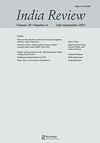Conceptualizing India’s response to the belt and road initiative: from norms to balancing strategies
IF 0.6
3区 社会学
Q3 AREA STUDIES
引用次数: 1
Abstract
ABSTRACT Despite deepening economic ties between India and China, the unresolved border dispute, Sino-Pak strategic ties and India’s openness to engage with the US-led regional security structures continue to affect the bilateral relationship. The inception of China–Pakistan Economic Corridor (CPEC) in 2015 generated strong protests from New Delhi citing violation of its territorial sovereignty and culminated in India’s refusal to participate in the Belt and Road Initiative (BRI). The statements emerging from the Indian foreign office and policymakers expressed concerns about the opacity of Chinese projects, debt trap, and the sovereignty risks to smaller nations’ economies in case of their inability to repay Chinese loans. While these factors objectively sum up India’s stance on the BRI, they simultaneously speak of India’s response to the BRI on a strategic level. The article argues that India’s approach to the BRI should be examined from its Moralpolitik-driven ethical deconstruction of the project, through which it attempts to legitimize its response strategy in balance of power terms.概念化印度对“一带一路”倡议的回应:从规范到平衡战略
尽管印度和中国之间的经济联系不断加深,但未解决的边界争端、中巴战略关系以及印度对参与美国主导的地区安全结构的开放态度继续影响着双边关系。2015年中巴经济走廊(CPEC)的启动引发了新德里的强烈抗议,理由是侵犯了其领土主权,并最终导致印度拒绝参与“一带一路”倡议。印度外交部和政策制定者发表的声明表达了对中国项目不透明、债务陷阱以及小国经济在无力偿还中国贷款的情况下面临的主权风险的担忧。这些因素客观地概括了印度对“一带一路”倡议的立场,同时也从战略层面阐述了印度对“一带一路”倡议的回应。本文认为,印度对“一带一路”的态度应该从其道德政治驱动的项目伦理解构来审视,通过这种解构,印度试图在权力平衡方面使其应对策略合法化。
本文章由计算机程序翻译,如有差异,请以英文原文为准。
求助全文
约1分钟内获得全文
求助全文

 求助内容:
求助内容: 应助结果提醒方式:
应助结果提醒方式:


